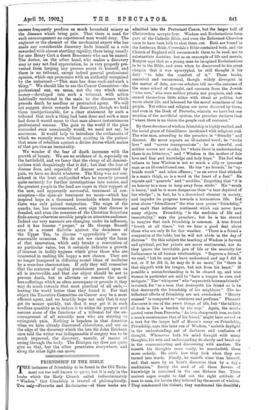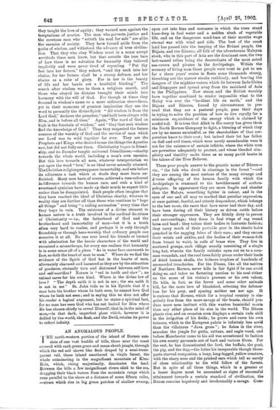FRIENDSHIP IN THE BLBLE.
instances of friendship to be found in the Old Testa- ment are too well known to qinte, but it is only in the books which the Early Church called indiscriminately " Wisdom" that friendship is treated of philosophically. Two only—Proverbs and Ecclesiastes—of these books are admitted into the Protestant Canon, but the larger half of Christendom accepts four. Wisdom and Ecclesiasticus form part of the Catholic Bible, and even the Reformed Churches seem to have been loth to shut them out. Both are bound in the Lutheran Bible, Coverdale's Bible contained both, and the Church of England still recommends them to be read, not to substantiate doctrine, but as an ensample of life and morals. Bunyan says that as a young man he imagined Ecclesiasticus to be in the Bible, and even when he discovered to his great chagrin that it was apocryphal, he still thought it his duty "to take the comfort of it." These books, canonical and uncanonical, though widely divergent in the matter of date, are—so scholars tell us—the outcome of the same school of thought, and emanate from the Jewish "wise men," who were neither priests nor prophets, and con. cerned themselves little either with ritual or politics, but wrote about life, and laboured for the moral soundness of the people. Yet ethics and religion are never divorced by them, and even in the Book of Proverbs, wherein we have but one mention of the sacrificial system, the preacher declares that "where there is no vision the people cast off restraint."
By these devotees of wisdom friendship is highly exalted, and the social grace of friendliness inculcated with religious zeal. The wise man, according to the preacher, is "friendly" and discreet. He never repeats an ill-natured word ; he "seeks love" and "covers transgressions " ; he is cheerful, and neither scorns nor mocks, for "where there is understanding there is no bitterness," and "Wisdom is the mother of fair love and fear and knowledge and holy hope." The fool who refuses to hear Wisdom is not so much a silly or ignorant man as an ill-conditioned one. He has "no friends," he " up- braids much" and takes offence ; "as an arrow that sticketh in a man's thigh, so is a word in the heart of a fooL" He repeats and " quarrels " and "meddles," forgetting that "it is an honour to a man to keep away from strife." His "wrath is heavy," and he is more dangerous than "a bear deprived of her whelps"; in fact, he is a discordant element in society, and impedes its progress towards a harmonious life. But even above " friendliness " the wise men praise "friendship," and exalt that intimate sentiment which can never have many objects. Friendship "is the medicine of life and immortality," says the preacher.; but he is too shrewd to imagine that such friendship is common. A true friend "loveth at all times," but we hear a good deal about those who are only fit for fair weather. "There is a friend a companion at the table, but he will not abide in the day of distress" On this subject the teaching of Wisdom is fervent and spiritual, yet her priests are never sentimental, nor do they ignore the inevitable jars of life or the necessity for forbearance in all human relationships. "Reprove a friend," we read, "lest he may not have understood and say I did it not, or if he did it, he may do it no more," for "there is that slippeth with his tongue, but not from his heart." If possible a misunderstanding is to be cleared up, and wise women in particular are said to "have a tongue to cure and mitigate." The " whisperer" who " separateth between friends" is cursed, for "as a man that destroyeth his friend so is he that destroyeth the friendship of his neighbour." The in- tellectual effects of friendship are not overlooked. "Hearty counsel" is compared to "ointment and perfume." Pleasant discourse is one of the sweet things of life, but "the talking of fools is like a burden by the way." Again, the much. quoted verse from Proverbs, "As iron sharpeneth iron, so cloth a man's countenance that of his friend," might have served as a text for the larger half of Bacon's essay on Friendship, Friendship, says this later son of Wisdom, " maketh daylight in the understanding, out of darkness and confusion of thought. Whosoever bath his mind fraught with many thoughts, his wits and understanding do clarify and break-up in the communicating and discoursing with another. He tosseth his thoughts more easily, he marshalleth them more orderly. He seeth how they look when they are turned into words. Finally, he waxeth wiser than 'himself, and that. more by an hour's discourse than by a day's meditation." Surely the seed of all these flowers of knowledge is contained in the one Hebrew line. These ancient sages sought to find out the right attitude of man to mar, for herein they believed lay the secret of wisdom. They condemned the violent; they condemned the deceitful;
they taught the love of equity; they warned men against the temptations of avarice. The man who perverts justice and the covetous man who " setteth his soul for sale" are alike the enemies of society. They have turned aside from the paths of wisdom, and withstood the advance of true civilisa- tion That they who obey Wisdom must in a sense accept servitude these men knew, but that outside the iron bars of Law there is no salvation for humanity they believed implicitly and were never tired of repeating. "Put thy feet into her fetters," they exhort, "and thy neck into her chains, for her fetters shall be a strong defence, and her chains as a robe of glory. For in her is the beauty of life and her bands are a healthful binding." The search after wisdom was to them a religious search, and those who obeyed its dictates brought their minds into harmony with the will of God. For though at times they descend in wisdom's name to a mere utilitarian shrewdness, yet in their moments of greatest inspiration they use the word to personify the divine Spirit "All wisdom is from the Lord God," declares the preacher," and bath been always with Him, and is before all time." Again, "The word of God on high is the fountain of wisdom," and "they that seek wisdom find the knowledge of God." Thus they suspected the future oneness of the worship of God and the service of man which our Lord was to weld together for ever. They are the Prophets and Kings who desired to see the things the Apostles saw, but did not fully see them. Christianity began in friend- ship, and its Founder taught universal friendliness,—obaxity towards the whole world, including a man's own enemies. But this love towards all men, whatever interpretation we put upon the word "love," is an ideal never actually attained. The Christian religion presupposes immortality, and seta before its adherents a task which at death they must leave un- finished. Many men have, of course, achieved a rose-coloured infifference towards the human race, and with a kind of sweetened cynicism have made up their minds to expect little rather than be disappointed. Such people often imagine that they have reached the ideal of Christian charity, whereas in reality they are further off than those who continue to " hope all things" and bring "a railing accusation" every time that they hope in vain. The existence of a divine element in human nature is a truth involved in the cardinal doctrines of Christianity — i.e., the fatherhood of God and the brotherhood and immortality of man—but it is a truth often very hard to realise, and perhaps it is only through friendship or through hero-worship that ordinary people can conceive it at all. No one ever loved his friends or burned with admiration for the heroic characters of the world and remained a misanthrope, for every one realises that humanity is in some sense all of a piece. "As in water face answereth to face, so doth the heart of man to man." Where do we find the evidence of the Spirit of God but in the hearts of men, alternately charmed and harassed as they are by the attraction of goodness, eternally torn and distressed between self-love and self-sacrifice? Nature is "red in tooth and claw "; no animal cares for his own kind. Where is the divine law of love ? "The depth saith it is not in me ; the sea saith it is not in me." St. John tells us in his Epistle that if a man hate his brother whom he bath seen, he cannot love God whom he bath not seen; and in saying this he does not offer his reader a logical argument, but he states a spiritual fact, for no man has seen God who has not looked for Him where He has chosen chiefly to reveal Himself; that is, in the mind of man,—in that dark, imperfect glass which, however it is defiled by the world, the flesh, and the Devil, retains its power to reflect infinity.



























































 Previous page
Previous page